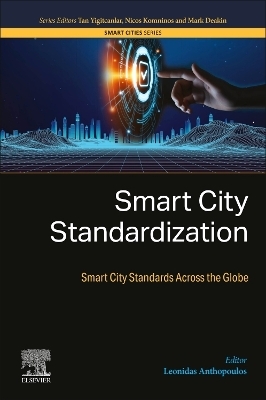
Smart City Standardization
Elsevier - Health Sciences Division (Verlag)
978-0-443-14144-7 (ISBN)
- Noch nicht erschienen (ca. Januar 2025)
- Versandkostenfrei
- Auch auf Rechnung
- Artikel merken
1. What is the purpose of standardization in smart cities? 2. How is smart city standardization established, and by whom? 3. Which standards exist for smart cities? 4. How do national standards transform international recommendations into smaller scale norms? Moreover, the standardization ecosystem is depicted, and the existing international standards are briefly explained. Finally, the interrelation between international and national standardization helps readers understand how the standardization is brought from high-level policymaking to national practices. These standards both clarify the smart city domain, and more importantly aim to homogenize the emerging intelligent solutions that cover the broad smart city scope, ranging from transportation and buildings, to waste, water, and energy. This book is a valuable resource for researchers, policymakers and other practitioners who need to understand how they can use smart city standards to support their communities to strengthen city resilience, as well as instructors of courses in urban studies, ICT, security, public health, engineering, public administration and business administration, and more, to understand the smart city context from practical examples and theoretical considerations.
Leonidas Anthopoulos is Professor of e-Business and Strategy at the University of Thessaly, Greece. He also serves as a Mayor’s Special Advisor of the city of Trikala, Greece, responsible for the Municipality’s smart agenda. Furthermore, he is a member of the ITU SG20 and head of the smart city standardization group of the Greek Standards (ELOT). He has been working in the smart city domain since the early 2000’s. His research has been published in such Elsevier journals as Cities, Sustainable Cities and Society, Technological Forecasting and Social Change and Government Information Quarterly.
1. Foreword
2. Introduction
A) Smart City Standardization: International Standards
3. International Telecommunications Union (ITU)
4. International Standards Organization (ISO)
5. International Electrotechnical Commission (IEC)
B) Smart City Standardization: European Union’s Efforts
6. CEN/CELENEC/ETSI
C) Smart City Standardization: National Efforts
7. Standardization in USA (National Institute of Standards and Technologies (NIST))
8. Standardization in UK (British Standards Institute (BSI))
9. Standardization in Austria (Austrian Standards (ASI))
10. Standardization in Germany (German Standards (DKE/DIN))
11. Standardization in Spain (Spanish Standards (AENOR))
12. Standardization in Greece (Greek Standards (ELOT))
13. Standardization in China (China National IT Standardization TC (NITS))
14. Standardization in South Korea (Korean Agency for Technology and Standards (KATS) / ETRI)
15. Standardization in Australia (Australian Standards)
16. Standardization in Argentina
17. Standardization in Dubai
18. Standardization in Kenya
| Erscheint lt. Verlag | 1.1.2025 |
|---|---|
| Reihe/Serie | Smart Cities |
| Verlagsort | Philadelphia |
| Sprache | englisch |
| Maße | 152 x 229 mm |
| Themenwelt | Naturwissenschaften ► Geowissenschaften ► Geografie / Kartografie |
| Sozialwissenschaften ► Soziologie | |
| ISBN-10 | 0-443-14144-4 / 0443141444 |
| ISBN-13 | 978-0-443-14144-7 / 9780443141447 |
| Zustand | Neuware |
| Haben Sie eine Frage zum Produkt? |
aus dem Bereich


